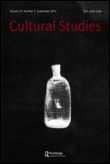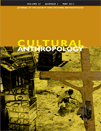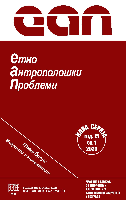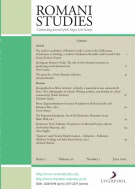
Slovensky Narodopis-Slovak Ethnology
Scope & Guideline
Bridging Local Heritage with Global Perspectives
Introduction
Aims and Scopes
- Cultural Heritage and Intangible Traditions:
The journal emphasizes the preservation and revitalization of cultural heritage, especially intangible cultural practices, through ethnographic studies and community engagement. - Social Change and Identity Formation:
It explores how sociopolitical transitions, particularly in post-socialist contexts, influence identity, community structures, and cultural practices among various ethnic and social groups. - Rituals and Religious Practices:
The journal frequently analyzes the role of rituals and religious practices in shaping cultural identity and social cohesion, focusing on their adaptive functions in contemporary society. - Migration and Transnationalism:
Research often addresses the impacts of migration on cultural identities and social relations, examining both historical and recent migration trends in Central Europe. - Grassroots Activism and Community Resilience:
The journal includes studies on grassroots movements and local activism, highlighting how communities respond to social challenges and cultural changes. - Folk Music and Oral Traditions:
It features investigations into folk music, oral histories, and traditional storytelling, emphasizing their roles in cultural memory and identity. - Political and Social Dimensions of Culture:
Papers often delve into the intersection of culture with political ideologies, examining how cultural expressions can both reflect and resist dominant power structures.
Trending and Emerging
- Precarity and Social Insecurity:
Recent publications increasingly address themes of precarity and insecurity, particularly in post-socialist contexts, highlighting the lived experiences of individuals and communities facing economic and social challenges. - Digital Culture and Online Communities:
There is a growing interest in how digital platforms and social media shape cultural expressions and identities, especially in the context of events like the COVID-19 pandemic. - Environmental and Cultural Ecology:
Emerging themes focus on the interplay between cultural practices and environmental issues, examining how communities adapt their traditions in response to ecological changes. - Intersectionality in Cultural Studies:
The journal is increasingly embracing intersectional approaches, analyzing how various social identities (such as gender, ethnicity, and class) intersect and influence cultural phenomena. - Activism and Resistance Movements:
There is a notable rise in research on grassroots activism and community-led initiatives, reflecting a broader societal engagement with cultural rights and social justice. - Reinterpretation of Festivals and Celebrations:
Recent studies delve into the transformation of traditional festivals and celebrations, exploring their contemporary meanings and roles within society.
Declining or Waning
- Historical Ethnography:
There has been a noticeable decline in publications focusing solely on historical ethnography, as contemporary issues and current social phenomena take precedence over historical analysis. - Traditional Craftsmanship:
Research dedicated to traditional crafts, while still relevant, has decreased in frequency, suggesting a shift towards more pressing contemporary cultural practices rather than historical craft preservation. - Static Cultural Representations:
Papers that depict cultures in static terms—focusing on unchanging traditions—are becoming less common, as the journal increasingly prioritizes dynamic cultural interactions and transformations. - Regional Studies with Limited Scope:
Studies that concentrate narrowly on specific regions without broader contextualization are seeing less attention, as there is a growing trend towards comparative analyses and transnational perspectives. - Theoretical Discussions Without Empirical Data:
There is a reduction in purely theoretical papers that lack empirical grounding, as the journal favors research that is supported by fieldwork and real-world applications.
Similar Journals

International Journal of Intangible Heritage
Fostering Global Conversations on Heritage.The International Journal of Intangible Heritage, published by the NATL FOLK MUSEUM KOREA-NFMK, stands as a premier platform dedicated to the exploration and preservation of intangible cultural heritage. With an ISSN of 1975-3586 and an E-ISSN of 1975-4019, this journal has successfully carved a niche in the fields of Conservation, Cultural Studies, and Museology, achieving Q1 categorization across these disciplines in 2023. It ranks impressively in Scopus, being #17/83 in Museology and #33/103 in Conservation, highlighting its significant contribution to the academic discourse in these fields. Published in South Korea, this journal not only serves as a vital resource for researchers and professionals but also engages students aspiring to enhance their understanding of intangible heritage. Accessible without an open access model, it features a blend of scholarly articles, reviews, and case studies from 2011 through 2024, making it a robust repository for current and emerging practices in the safeguarding of cultural expressions. By fostering innovative dialogue among scholars and practitioners globally, the International Journal of Intangible Heritage plays a crucial role in the ongoing dialogue surrounding the value and significance of intangible cultural assets.

AMERICAN ETHNOLOGIST
Unveiling the Rich Tapestry of Human ExperienceAMERICAN ETHNOLOGIST, published by Wiley, stands as a prominent platform in the field of anthropology, with a distinguished reputation underscored by its Q1 ranking in the 2023 Category Quartiles and a notable position in the 79th percentile among its peers. With its foundation dating back to 1974 and set to continue until 2024, this journal serves as a vital resource for researchers, practitioners, and students devoted to exploring cultural dynamics and social practices across diverse communities. The journal is characterized by its commitment to advancing theoretical discussions and empirical scholarship in ethnology and related disciplines. Targeted contributions include in-depth studies, critical reviews, and innovative methodologies that engage with pressing cultural issues. Although it does not offer Open Access, the journal’s rigorous peer-review process and high-impact articles ensure the dissemination of valuable insights, enhancing scholarly engagement and professional discourse. Its ISSN is 0094-0496 and E-ISSN is 1548-1425, emphasizing its dual format accessibility, which facilitates wider readership within the anthropology community.

CULTURAL STUDIES
Illuminating the Rich Tapestry of Society and CultureCULTURAL STUDIES, published by Routledge Journals, Taylor & Francis Ltd, is a prestigious academic journal dedicated to the exploration and analysis of cultural phenomena across diverse contexts. With an ISSN of 0950-2386 and an E-ISSN of 1466-4348, this journal has established itself as a leading platform for scholars, researchers, and practitioners interested in the intersections of culture, identity, and society. Since its inception, CULTURAL STUDIES has transitioned through several converged years of publication, currently producing cutting-edge research that reflects its strong positions in Q1 quartiles across multiple disciplines, including Anthropology, Social Sciences, and Arts and Humanities. With an impressive Scopus rank of 75/1304 in Cultural Studies, the journal is an essential resource for those seeking to engage with the latest theoretical frameworks and methodologies in understanding cultural dynamics. Although it is not currently open access, CULTURAL STUDIES remains a critical vessel for disseminating knowledge that impacts both academic and practical applications in cultural analysis. For scholars and students eager to contribute to this vibrant field, the journal serves not only as a repository of knowledge but also as an inspiration for further inquiry into the complexities of culture.

Lares-Quadrimestrale di Studi Demoetnoantropologici
Exploring the Rich Tapestry of Human CulturesLares-Quadrimestrale di Studi Demoetnoantropologici is a prominent scholarly journal dedicated to the fields of demoethnoanthropology, exploring the intersections of cultural practices, traditions, and social dynamics. Published by CASA EDITRICE LEO S OLSCHKI, this esteemed journal provides an academic platform for researchers and practitioners to disseminate original research findings and critical reviews, delving into ethnographic studies and community-based inquiries. With an ISSN of 0023-8503 and an E-ISSN of 2036-511X, Lares is recognized for its commitment to scholarly excellence and its contribution to advancing knowledge within its field. Although it currently categorizes as non-open access, the journal remains highly regarded among academics, ensuring the widespread dissemination of significant research. The journal's base in beautiful Florence, Italy, enhances its cultural richness and appeal, making it a notable reference point for scholars dedicated to the study of human cultures and social systems.

Zeitschrift fur Empirische Kulturwissenschaft
Illuminating Diverse Cultural Practices and PerspectivesZeitschrift fur Empirische Kulturwissenschaft is a prominent academic journal dedicated to the empirical study of cultural phenomena. Published by WAXMANN VERLAG GMBH, this journal serves as a vital platform for researchers and professionals interested in the intersections of culture, society, and empirical research methodologies. With its ISSN 2752-1591 and E-ISSN 2752-1605, it aims to foster scholarly discourse and innovation in the field of cultural studies. The journal encourages contributions that explore diverse cultural contexts and practices, providing insights that are both rigorous and relevant. Although the journal does not currently offer open access, its commitment to disseminating high-quality research makes it a crucial resource for anyone looking to deepen their understanding of empirical culture studies. Zeitschrift fur Empirische Kulturwissenschaft plays an important role in advancing the academic exploration of culture, contributing to the landscape of interdisciplinary research and supporting the next generation of scholars and practitioners.

CULTURAL ANTHROPOLOGY
Fostering Interdisciplinary Dialogues in AnthropologyCULTURAL ANTHROPOLOGY is a premier journal in the field of anthropology, published by the esteemed SOC CULTURAL ANTHROPOLOGY. With an impressive impact factor and ranking in the Q1 category for both anthropology and arts and humanities, it stands as a leading platform for scholarly discourse and innovative research. Since transitioning to Open Access in 2014, the journal has made substantial contributions to the accessibility of anthropology literature, allowing a broader audience to engage with cutting-edge anthropological insights and findings. The journal's scope encompasses a wide range of cultural studies and anthropological perspectives, catering to a diverse readership that includes researchers, professionals, and students. Published from the Department of Anthropology, Rice University in Houston, Texas, CULTURAL ANTHROPOLOGY continues to shape the conversation in its field, promoting interdisciplinary dialogue and enriching the academic landscape.

Shima-The International Journal of Research into Island Cultures
Navigating the Intricacies of Island Life and CultureShima - The International Journal of Research into Island Cultures is a distinguished academic platform dedicated to exploring the multifaceted cultural dynamics and social phenomena specific to island societies. Published by Macquarie University, Division of Humanities in Australia, this open access journal has been a vital resource since its inception in 2007. With an impressive H-index and a convergence period from 2017 to 2024, Shima occupies a significant niche in various disciplines, evident in its 2023 quartile rankings, including Q1 in History and Q2 in Cultural Studies, among others. The journal's robust impact is reflected in its notable Scopus ranks, positioning it favorably among peer institutions, particularly in History and Cultural Studies. Researchers, students, and professionals who are engaged in island studies, anthropology, and related fields will find Shima a valuable repository for contemporary research, innovative methodologies, and interdisciplinary insights that highlight the rich cultural narratives of island communities.

Etnoantropoloski Problemi-Issues in Ethnology and Anthropology
Promoting open access to vital ethnological discussions.Etnoantropoloski Problemi-Issues in Ethnology and Anthropology, published by the University of Belgrade, Faculty of Philosophy, is a prestigious open-access journal dedicated to advancing the fields of ethnology and anthropology. With its ISSN 0353-1589 and E-ISSN 2334-8801, the journal has been a crucial platform since 2006, facilitating the dissemination of innovative research and critical discussions among scholars worldwide. As an open-access journal, it ensures that valuable insights and findings are readily accessible, promoting knowledge sharing and collaboration across the academic community. The journal aims to explore and address contemporary issues in cultural studies, social dynamics, and human behavior, emphasizing the relevance of ethnological and anthropological research in understanding our increasingly interconnected world. Researchers, professionals, and students alike will find Etnoantropoloski Problemi an essential resource for staying informed about the latest developments and debates within these dynamic disciplines.

FOLK MUSIC JOURNAL
Advancing Scholarship in Folk HeritageFolk Music Journal, published by the English Folk Dance Song Society, is a prominent publication within the fields of Music and Visual Arts and Performing Arts. This journal, based in the United Kingdom at Cecil Sharp House, has been instrumental in advancing the study and appreciation of folk music, sharing invaluable research and insights from 2002 until its recent coverage concluded in 2020. Notably indexed with a Q3 rank in both the Music and Visual Arts categories for 2023, it stands as a significant resource for researchers, professionals, and students alike, contributing to a deeper understanding of folk music's cultural impact. Although it does not currently offer Open Access, the journal has fostered scholarly discourse, reflecting its vital role in the preservation and analysis of traditional musical forms.

Romani Studies
Illuminating the Social Dynamics of Romani CommunitiesRomani Studies is a distinguished academic journal published by Liverpool University Press that focuses on the rich cultural, social, and historical dimensions of Romani communities both in Europe and globally. With an ISSN of 1528-0748 and an E-ISSN of 1757-2274, the journal has been actively contributing to the field since 2012 and continues to engage researchers, professionals, and students interested in issues related to anthropology and cultural studies, categorically recognized in the Q3 quartile in both fields for 2023. The journal holds a remarkable position, ranking #439 out of 1304 in Cultural Studies and #268 out of 502 in Anthropology according to Scopus, highlighting its significance in advancing scholarly discourse. Although it is not an open-access journal, Romani Studies provides valuable insights through its meticulously peer-reviewed articles that aim to foster understanding and awareness of Romani identities, cultures, and the challenges faced by these communities. With its commitment to academic excellence and relevance, Romani Studies serves as an essential resource for anyone invested in the exploration of multicultural narratives and the complexities of social dynamics.